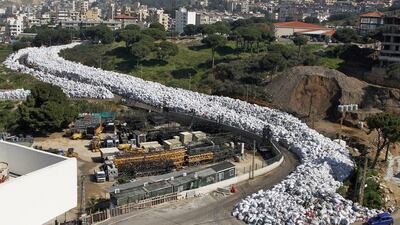Lebanon’s report card for 2016 might read: “Bright and resilient but often disruptive. Must do better.”
And yet it was a year that ended on a high, of sorts. After a two-and-half-year hiatus, the Lebanese had a new president and a government. And despite the usual suspects once again being handed ministerial portfolios, including a man to run Women’s Affairs and a pensioner tasked to oversee the Ministry of Youth – just to highlight a few of the puzzling appointments – most Lebanese were just happy that country was again open for business.
Back in January things were looking decidedly dicey. There appeared to be no let up in the number of Syrians fleeing over the border, taking the unofficial number of refugees to nearly 2 million, equivalent to 50 per cent of the population, or to put it another way it’s as if 36 million Europeans moved to the United Kingdom over the same period. On this point, at least, we won the world’s admiration.
We also had a garbage crisis of apocalyptic proportions, which began in July of the previous year and, in January, showed no sign of ending. Hundreds of thousands of tonnes of trash quite literally had nowhere to go and the Ministry of Health reported an alarming spike in respiratory illness.
Both were bad for business. The burden of giving refuge to 2 million extra souls placed enormous strain on an already weakened infrastructure and there soon may not be enough water, electricity, road space and broadband to go around; hardly a mouthwatering environment for foreign investment, which, according to the United Nations Conference on Trade and Development (Unctad), had already fallen by 19.4 per cent to US$2.34 billion in 2015 from the year earlier, and down from $4.38bn in 2009.
There was also little meaningful progress made on Lebanon’s ambitions to tap into potentially significant oil and gas reserves after the likes of Total, Shell, Chevron and ExxonMobil signalled that they were fed up with having to deal with corrupt Lebanese officials in what should have been a relatively transparent process. Let’s see what the new government can do, but I’m not holding my breath.
In February, there was bad news for tourism and what little inward investment we could muster when Lebanon, at a meeting of the Arab League, refused to condemn the January 2 sacking of the Saudi Embassy in Tehran. The kingdom reacted immediately, threatening to withdraw its deposits in Lebanese banks and withholding $4bn earmarked for the Lebanese army and security services. More worrying was a travel advisory warning Saudi citizens about the security risks of travelling to Lebanon. For those trying to go the other way, the much-maligned Lebanese passport made it into Henley & Partners Visa Restrictions Index of the Top 10 worst travel documents to own.
In May, Beirut held municipal elections in which voters had a chance to elect people who might actually serve the capital. The Beirut Madinati – Beirut My City – bloc pledged to work towards turning Beirut into a greener, happier and more prosperous city, developing infrastructure, tourism and the financial sector, and reforming housing development. So what happened? The people voted for the same bunch of people responsible for creating and failing to solve, the garbage crisis. Plus ça change indeed.
In other news, the Lebanese Central Bank suspended three senior Hizbollah members’ accounts. The party declared that the Central Bank had “crossed a red line” while the bank said it was merely abiding by the Hizbollah International Financing Prevention Act, which targets banks that deal with Hizbollah or individuals, businesses or institutions linked to the party. One Hizbollah MP called the law “a violation of Lebanon’s sovereignty”, forgetting perhaps that sovereignty was a concept with which his party has played fast and loose for the past 10 years.
Meanwhile, at a conference in Beirut over the summer, the industry minister, Hussein Hajj Hassan, made the extraordinary admission that the political class doesn’t really bother itself with economic priorities. “[We] never had one serious discussion in the cabinet on activating the economy and helping the struggling industry in the country,” he told the audience.
At one point over the summer were told that Europeans topped the list of foreign tourists. The French apparently loved us the most, followed by the Germans and the British. The Americans and Canadians, came second and the Brazilians third. Arabs came in fourth with the Iraqis cited as the most frequent visitors, followed by Jordanians and Egyptians. The number of Saudi Arabian nationals visiting Lebanon in June dropped by a whopping 47.7 per cent.
The November 8 US presidential elections coincided with the airing of an ad on CNN sponsored by the Lebanese developer Demco Properties. “Lebanon is calling”, was a 40-second clip aimed to woo back expatriate talent, presumably in light of the news of General Michel Aoun’s presidential nomination.
It made no difference to HSBC, whose local operation was sold off to BLOM bank for about $100 million. HSBC, then the British Bank of the Middle East, opened in Beirut in 1946, ending a 70-year association with the country.
Happy New Year to all.
Michael Karam is a freelance writer who lives between Beirut and Brighton.
business@thenational.ae
Follow The National's Business section on Twitter

